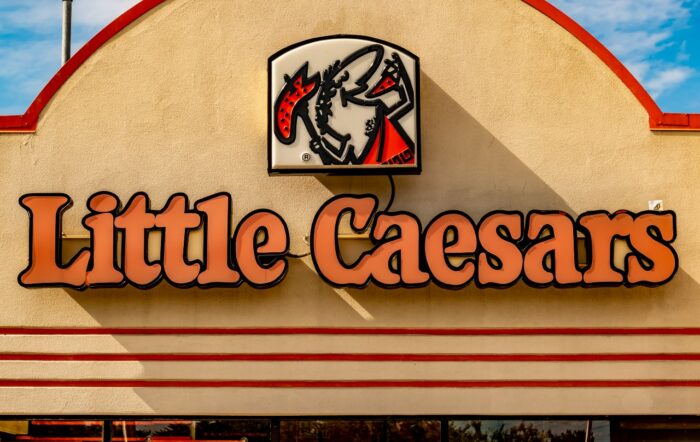Top Class Actions’s website and social media posts use affiliate links. If you make a purchase using such links, we may receive a commission, but it will not result in any additional charges to you. Please review our Affiliate Link Disclosure for more information.

Update:
- Little Caesars agreed to pay nearly $7 million to resolve claims it violated Illinois biometric privacy law by using a fingerprint scanner as a timekeeping system without first obtaining employee consent.
- The pizza restaurant chain and a former employee behind the complaint asked a federal judge in Illinois to approve the settlement agreement.
- The settlement agreement was made on behalf of a class of 8,407 Little Caesars employees.
- Eligible class members are each expected to receive around $545 in compensation.
- Little Caesars maintains it is not guilty of any wrongdoing or liability, including claims it violated the Illinois Biometric Information Privacy Act (BIPA).
Little Caesars BIPA class action lawsuit overview:
- Who: Little Caesars employees have their class action lawsuit claiming the food chain violated BIPA stayed.
- Why: The case has been put on hold by an Illinois judge until three rulings come through in state courts on related BIPA issues.
- Where: The class action seeks to represent Little Caesars employees in Illinois.
(Oct. 22, 2021)
Little Caesars employees alleging violations of the Illinois Biometric Information Privacy Act (BIPA) in a class action will have to wait after the lawsuit was put on hold by a federal judge until three rulings come through in state courts.
Despite opposition from the employees, U.S. District Court Judge Robert M. Dow Jr. ruled in favor of Little Caesar Enterprises’ request and their assertion that these rulings will “dramatically shape the remainder of this lawsuit and class certification proceedings.”
“Staying the case pending the appellate courts’ decisions would simplify and streamline further proceedings and, in turn, reduce the burden of litigation on the parties and the Court during the class certification phase and beyond,” Dow wrote.
Little Caesars collected employee identifiers without consent, class action says
In the class action lawsuit, lead plaintiff Brianna Starts alleges Little Caesars violated BIPA by capturing and collecting employees’ biometric identifiers and information without obtaining consent, failing to create a written policy establishing a retention schedule and destruction guidelines for the data and disseminating the data to its timekeeping vendor without consent.
Dow wrote that the Illinois Supreme Court’s forthcoming decision in a similar lawsuit against McDonald’s will resolve whether the exclusive remedy of the Illinois Workers’ Compensation Act bars employees’ BIPA claims against their employers.
He added that the appeals in other cases also have the potential to substantially reduce the size of any Class that is certified in the Little Caesars lawsuit by clarifying whether a one- or five-year statute of limitations applies to BIPA actions, and also when those claims accrue — either the first time an employer collects an employee’s biometric identifiers and information, or each time an employee collects such data.
Dow says in his ruling that he was not persuaded that Starts would be unduly prejudiced or tactically disadvantaged if a stay is granted.
“Plaintiff contends that Defendant waited too long to seek a stay, because class discovery has already been completed,” Dow wrote in the order pausing the Little Caesars BIPA class action.
“However, in terms of prejudice, this appears to have benefitted Plaintiff: as soon as the appellate courts issue their decisions, class certification briefing can begin, without the need for any further discovery.”
He added that a stay would significantly advance judicial economy and spare the parties the burden of unnecessary briefing, without causing any significant hardship to Smarts.
Do you want information about class actions filed against Little Caesars and other big companies? Sign up for the Top Class Actions newsletter!
The plaintiff is represented by Douglas M. Werman, Zachary C. Flowerree, Sarah J. Arendt and Maureen A. Salas of Werman Salas PC.
The Little Caesars BIPA class action lawsuit is Brianna Starts v. Little Caesar Enterprises Inc., Case No. 1:19-cv-01575, in the U.S. District Court for the Northern District of Illinois.
Don’t Miss Out!
Check out our list of Class Action Lawsuits and Class Action Settlements you may qualify to join!
Read About More Class Action Lawsuits & Class Action Settlements:
- Whole Foods Ice Cream Bars Made With ‘Vegetable Oil Coating,’ Class Action Alleges
- Illinois Chain Sunset Food Mart Loses Appeal, Will Face Biometric Privacy Class Action
- Tyson Foods, Pilgrim’s, Mar-Jac Reach Settlements Worth Combined $93.5 Million Over Broiler Chicken Price Fixing Claims
- Sugar Babies, Junior Mints Underfilled Boxes Class Action Claims Tossed—For Now















8 thoughts onLittle Caesars seeks approval of $7M employee biometric data settlement
My son was a Utah employee, are they included?
Add me
Add me
Add me
Add me i buy every week 2 pizzas and 2 8 piece wings
Add me
Add me
Add me to the Lawsuit!